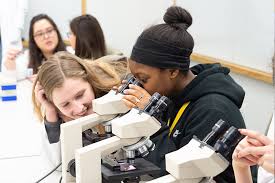A new study conducted by the Royal Society in collaboration with EngineeringUK and with funding from Wellcome has revealed a significant gender disparity in young people’s interest in science and engineering as well as a dramatic fall in practical science.
For the first time, engineering-specific questions were included in the third Science Education Tracker (which was previously administered in 2016 and 2019) in this survey from 2023.
The tracker examined the opinions and experiences of seven thousand youth towards scientific education and careers. Given the present and anticipated shortages in the engineering and technology sector, the results are alarming to read.
Laptops 1000Most schoolchildren view engineering jobs as creative and adaptable, and more than half of young people think they could pursue an engineering profession if they so choose.
However, as kids go through the educational system, their interest in engineering occupations declines (55% of year 7 students compared to 39% of students in year 13).
Girls are more likely than males to state that they are not interested in a STEM (science, technology, engineering, and math) job because they don’t enjoy the subjects (57% vs. 41%) and don’t think they are competent at them (38% vs. 20%).
Boys report knowing far more about engineering occupations than girls do, across all age groups, and they are also more inclined to believe that engineering is something they should pursue.
Compared to 38% of boys, only 12% of girls feel that being an engineer is a good fit for who they are. Furthermore, just 16% of girls—compared to 44% of boys—believe that they would be good candidates for an engineering job.
For 52% of students in years 7 through 9, doing practical science is the primary reason for learning science; girls are statistically more likely to claim this.
However, there are fewer possibilities for students to gain practical experience in the classroom; only 26% of GCSE students complete practical work at least once every two weeks.
Students who are normally less engaged in science are more eager for additional practical work, with 70% of secondary school students expressing a desire to do more.
Students who claim they have no interest in science or who believe it is “not for me” fall into this category. 32% of adolescents in grades 7 through 13 belong to the “not for me” category, and girls are more likely to be in this group. In fact, according to 36% of girls, science is not for them.
Youth involvement in extracurricular activities increases their interest in STEM fields. Students who visited a firm reported feeling motivated to pursue STEM topics, while 45% of students who heard from a STEM professional at their school expressed a similar sentiment.
However, only 43% of pupils participated in extracurricular STEM activities the year before. There is also a dearth of work experience in STEM fields. Only 15% of young students had completed a STEM-related work experience, and 26% were eager to do so but were unable to find a position.
Laptops 1000“We need hundreds of thousands more people entering STEM careers to get on track to meet net zero, to improve sustainability, and for the UK to prosper,” stated Dr. Hilary Leevers, Chief Executive of EngineeringUK.
The tracker’s results are a severe wake-up call. As students advance in their education and have a better awareness of the opportunities accessible to them, we must do more to maintain their enthusiasm in STEM.
The government needs to find ways to make science, math, and computer science instruction more interesting for all students and to help them feel more confident in these subjects—especially in the case of girls.
Additionally, we need to make sure that every student has a professional experience that highlights prospects in fields like engineering that are scarcely represented in the current curriculum.
The engineering community must also take the initiative to show young people the variety of career options available to them in technology and engineering. We have the power to motivate and inspire them to pursue STEM further. By providing hands-on activities, we should also try to counteract the loss of practical lessons whenever we can.
The chair of the Royal Society’s Education Committee, Professor Ulrike Tillmann FRS, continued, saying: “Science is amazing because it has applications. You can touch and feel it; it is not only something you think about.
This is true in the classroom and in day-to-day living. Science will feel more relevant and important to students and give them with useful skills for both life and the workplace if they have access to good hands-on learning that they can physically link to the real world.
More details and the Science Education Tracker report may be found at www.engineeringuk.com/set.


















